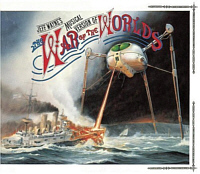Jeff Wayne's The War of the Worlds (1978) part 1

No other version of The War of the Worlds has done more to popularise
H. G. Wells' story of Martian invasion than that created in 1976 by Jeff
Wayne, winning numerous awards along the way, setting records and
capturing the imaginations of people who would normally never consider
themselves as science fiction fans. Even some twenty years later, the
hugely ambitious double album shows no sign of losing its appeal, with
a re-mastered re-release back in the charts in 2005 and a lavish stage
show wowing audiences in the UK. Most intriguingly, there are even plans
for a computer animated movie version for 2007.
The story of the making of The War of the Worlds album is one of
relentless determination and optimism in the face of daunting odds. It's
almost the album that shouldn't have been and a testament to the talents
of Wayne and the extraordinary cast and crew he assembled.
 Jeff Wayne was born
into a showbiz family that had suffered badly
during the McCarthy era. His father Jerry (an actor, singer and theatre
producer) had been blacklisted by the House Of Un-American Activities
Committee for playing a benefit for the singer Paul Robeson, himself a
victim of the purge, but luckily for his father, in 1953 an opportunity
presented itself in England. Jerry was offered the plum role of the
gambler Sky Masterson in the original West End musical production of
Guys and Dolls (it ran from May 28th 1953 at London's Coliseum Theatre
for 555 performances) and as a result Jeff was to spend four formative
years in England. Returning to the US to finish his education, he then
pursued a career in the pop music industry, rubbing shoulders with The
Righteous Brothers and playing with The Sandpipers, yet his career never
quite caught fire. Jeff Wayne was born
into a showbiz family that had suffered badly
during the McCarthy era. His father Jerry (an actor, singer and theatre
producer) had been blacklisted by the House Of Un-American Activities
Committee for playing a benefit for the singer Paul Robeson, himself a
victim of the purge, but luckily for his father, in 1953 an opportunity
presented itself in England. Jerry was offered the plum role of the
gambler Sky Masterson in the original West End musical production of
Guys and Dolls (it ran from May 28th 1953 at London's Coliseum Theatre
for 555 performances) and as a result Jeff was to spend four formative
years in England. Returning to the US to finish his education, he then
pursued a career in the pop music industry, rubbing shoulders with The
Righteous Brothers and playing with The Sandpipers, yet his career never
quite caught fire.
Then in 1966 came an invitation from his father to return to
England. Jerry had been developing a stage version of Charles Dickens'
A Tale Of Two Cities, called Two Cities, and wanted his son to compose
the score. The musical which ran at the Palace Theatre has been described
variously as both a great success and a failure, but Edward Woodward
certainly won acclaim for his performance as Sydney Carton, scooping
the Evening Standard Award for Best Male Performance in a Musical for 1968-69.
Staying put in England, Jeff found himself developing a career (and
very good reputation) in advertising, creating jingles for radio, including
one for Gordon's Gin which was strangely covered (and re-covered) by the
Human League. It wasn't long before Jeff parlayed his radio work into a
successful musical collaboration with the singer David Essex, whom he had
originally recruited to his advertising team. The two produced a number of
hit singles together, (including the UK number one, "Rock On") but it was
Wayne senior who was to remind his son that there remained an unfulfilled
ambition to be achieved. A Tale Of Two Cities had fired the pair up with the
determination to write something with meaning and grandeur, but what to do?
Jeff and wife Geraldine spent a great deal of time in the library,
largely looking at children's books, but then when nothing caught their
imagination, moved to the science fiction section. The Day of the Triffids
and Brave New World caught their eye, but it was The War of the Worlds that
spoke to Jeff in no uncertain terms. As he has commented in interviews, it
was the first story he had read that excited him as a musician. He could
hear the sounds as he read it, and the way Wells used his fictional tale
as an allegory of the injustices of Empire was appealing to both father and
son, especially given their history of persecution.
Luckily, though H.G. Wells had sold the movie rights to Paramount in
perpetuity, his estate (in the person of Wells' brother Frank) saw the
potential of a musical version and was very happy to confer the relevant
permissions. With a subject decided on, Jeff turned for finance to CBS
producer Dick Asher, who had previously bankrolled his and Essex's first
collaboration. It was a fortuitous choice, when the size of the album
doubled, as did the initial cost estimate of $34,500. Asher duly handed
over and $34,000 and Jeff worked at spending it, commissioning the brilliant
science fiction artist Roger Dean to work on the sleeve design and interior
illustrations, though the relationship soured when Dean reportedly turned
in a massive 64-page page proposal, that Jeff felt diminished the album to
something that merely accompanied Dean's work. The job would finally be
divided between several artists. Mike Trim, who had begun his career working
for Gerry Anderson on iconic shows such as Stingray and Thunderbirds provided
the cover illustration for The War of the Worlds album, a stunning illustration
of a Tripod battling the Thunderchild. Contributing equally fine work to the
interior art, (forming a stunning accompanying booklet) were Geoff Taylor and
Peter Goodfellow.
For his script, Jeff turned to his father's second wife Doreen for help,
an established writer, having worked for The Sunday Times and penned a best
selling novel. She, Jeff and his father worked together on The War of the Worlds,
in a process that saw Jeff specify areas in the book he felt would work musically
on the album, which Doreen would then write before passing to Jerry for proofing.
A back and forward process of proof and polish resulted in pages that Jeff could
use as the basis of his music.
Of course one of the defining aspects of Wayne's War of the Worlds is the
brilliantly inspired choice of Richard Burton to play the role of the narrator.
Burton's resonate voice lends a huge amount of gravitas to the production, but
his inclusion in the cast was extremely lucky, one might even say down to fate.
Burton was in New York at the time starring in Peter Shaffer's Tony award winning
play Equus and with no better way in mind, Wayne simply had his script and a
covering letter delivered to Burton via the stage door. This hopeful missive might
have gone unregarded had not Burton's 4th and final wife just recently supplied him
with a pile of reading material to wile away his time in the dressing room.
Unbelievably, this random stack of books had included Wells' The War of the Worlds!
Burton had thoroughly enjoyed the book, and within two days, had signed on with Wayne.
Burton later told Wayne "It was meant to be."
The actual recording took place in a number of locations, with Burton's work
done in California. He had been booked for four days, but ever the consummate professional,
he was done in one, helped no doubt by his considerable respect for the material and
(in keeping with his hellraiser reputation) a steady supply of Coors beer. Jeff
Wayne speaks in fulsome terms of that day, as Burton poured his heart and soul into
the work, frequently requesting retakes when Jeff was perfectly happy with the first
effort. This was not incidentally the first time Burton has worked in the area of
spoken word; he had won an Emmy in 1975 for his performance on The Little Prince.
Part 2 >
|
Buy
Single disc DVD
Double disc DVD
Regular version CD
Collectors edition CD
See also in:
Music
|
2006
The War of the Worlds by Jeff Wayne. Big stage version of the classic record that has toured the UK to great acclaim.
|
Film and TV
|





